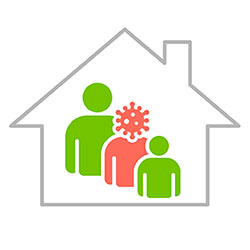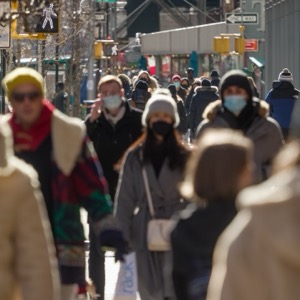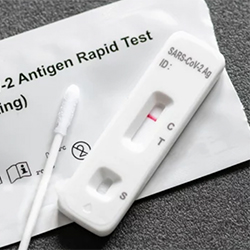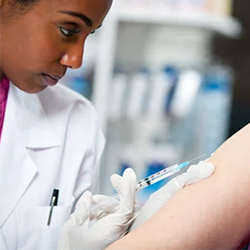Originally published by our sister publication Infectious Disease Special Edition
By Marie Rosenthal, MS
Ensitrelvir, an antiviral being developed to prevent COVID-19, reduced the risk of developing the infection by 67% in uninfected people after exposure to SARS-CoV-2 compared with placebo at day 10, according to results presented at CROI 2025, held in San Francisco (abstract 200).

The SCORPIO-PEP (Stopping COVID-19 pRogression with early Protease InhibitOr treatment–Post-Exposure Prophylaxis) trial assessed 2,387 study participants, who were 12 years of age and older with a negative screening test for SARS-CoV-2 infection and no symptoms at the time of enrollment. The participants were exposed to a person living in the household who developed symptomatic COVID-19. In this double-blind trial, study participants were randomly assigned to receive 125 mg of ensitrelvir or placebo, once daily, and began prophylaxis within 72 hours of symptom onset in the household member with COVID-19, according to Frederick Hayden, MD, a professor emeritus at the University of Virginia School of Medicine, in Charlottesville.
The household contacts were monitored with frequent nasal swabs to detect infection, and they recorded their symptoms. The primary end point for this trial was to assess the proportion of household contacts who developed COVID-19 through day 10. SARS-CoV-2 infection was confirmed by central laboratory real-time polymerase chain reaction (PCR) testing, as well as by the development of an illness with at least one of 14 predefined COVID-19 symptoms that had to last for at least 48 hours.
“Ensitrelvir reduced the risk of COVID in initially uninfected contacts from 9% in the placebo group to 2.9% in the ensitrelvir group, during that 10-day period [risk ratio, 0.33; 95% CI, 0.22-0.49; P<0.0001],” Dr. Hayden said at a media briefing, held by CROI.
“This then demonstrated a statistically significant 67% reduction in the risk for developing COVID,” he said.
Diane Havlir, MD, the CROI chair, called the 67% reduction “super exciting.” Dr. Havlir is a professor at the University of California, San Francisco, and the chief of the HIV, Infectious Diseases and Global Medicine Division at Zuckerberg San Francisco General Hospital and Trauma Center.
Overall, 37% of the household contacts had conditions that put them at risk for serious COVID-19. Among this group, “the analysis indicated the risk for COVID was reduced by fully 76% and the drug was generally well tolerated,” Dr. Hayden said.
The secondary analysis population included 2,387 household contact participants who had a negative local test for SARS-CoV-2 but did not exclude those with a central laboratory–positive SARS-CoV-2 PCR at baseline. The results were similar to the primary analysis population, with 4.4% of participants treated with ensitrelvir developing symptomatic COVID-19 compared with 10.2% of those on placebo (risk ratio, 0.43; 95% CI, 0.32-0.59; P<0.0001).
“This is the first, and to my knowledge to date, only phase 3 trial of an oral SARS-CoV-2 antiviral medicine to meet the primary end point of preventing COVID in those exposed to someone with the illness,” Dr. Hayden said. “This protective effect was shown in those at increased risk for severe disease.”
There were similar rates of adverse events in the placebo and ensitrelvir groups, with headache being the most commonly reported one, according to Dr. Hayden.
Ensitrelvir is a 3CL protease inhibitor (PI), which works by suppressing the replication of SARS-CoV-2 by selectively inhibiting the 3CL PI, which is essential for the replication of the virus. Ensitrelvir suppresses the replication of SARS-CoV-2 by selectively inhibiting the 3CL PI (J Med Chem 2022;65[9]:6499-6512).
“As we know, COVID-19 remains a major threat to public health, and despite advances in COVID therapies, there are currently no approved oral medicines to prevent the illness in people who have been exposed to a person ill with SARS-CoV-2 infection,” Dr. Hayden said.
Currently, there are no approved medicines for post-exposure prophylaxis. The FDA granted ensitrelvir a Fast Track designation in 2025 for PEP of COVID-19 after contact with an individual who has COVID-19.
Ensitrelvir, known as Xocova, is approved in Japan, where it received emergency regulatory approval in 2022 and full approval in March 2024 for the treatment of COVID-19. It became available in Singapore via a Special Access Route application in 2023, and it is currently under regulatory review in Taiwan.
Shionogi evaluated the safety and efficacy of ensitrelvir through SCORPIO-SR, a phase 3 study conducted in Asia, during the omicron-dominant phase of the pandemic. In this study, ensitrelvir showed both clinical symptomatic efficacy for five typical Omicron-related symptoms (primary end point) and antiviral efficacy (key secondary end point) in a predominantly vaccinated population of patients with mild to moderate SARS-CoV-2 infection, regardless of risk factors (JAMA Netw Open 2024;7[2]:e2354991).
The phase 3 SCORPIO-HR study also assessed ensitrelvir in a broad range of symptomatic, nonhospitalized participants with COVID-19, regardless of past SARS-CoV-2 infection. The study did not meet its primary end point of a statistically significant reduction in time to sustained resolution (symptom resolution sustained for ≥48 hours) of 15 common COVID-19–related symptoms for once-daily ensitrelvir compared with placebo (Clin Infect Dis2025 Feb 17. doi:10.1093/cid/ciaf029).
Another study is ongoing in hospitalized patients for the management of COVID-19 as part of the STRIVE (Strategies and Treatments for Respiratory Infections & Viral Emergencies) platform protocol. STRIVE was developed under the auspices of the National Institutes of Health Accelerating COVID-19 Therapeutic Interventions and Vaccines (ACTIV) public–private partnership.




